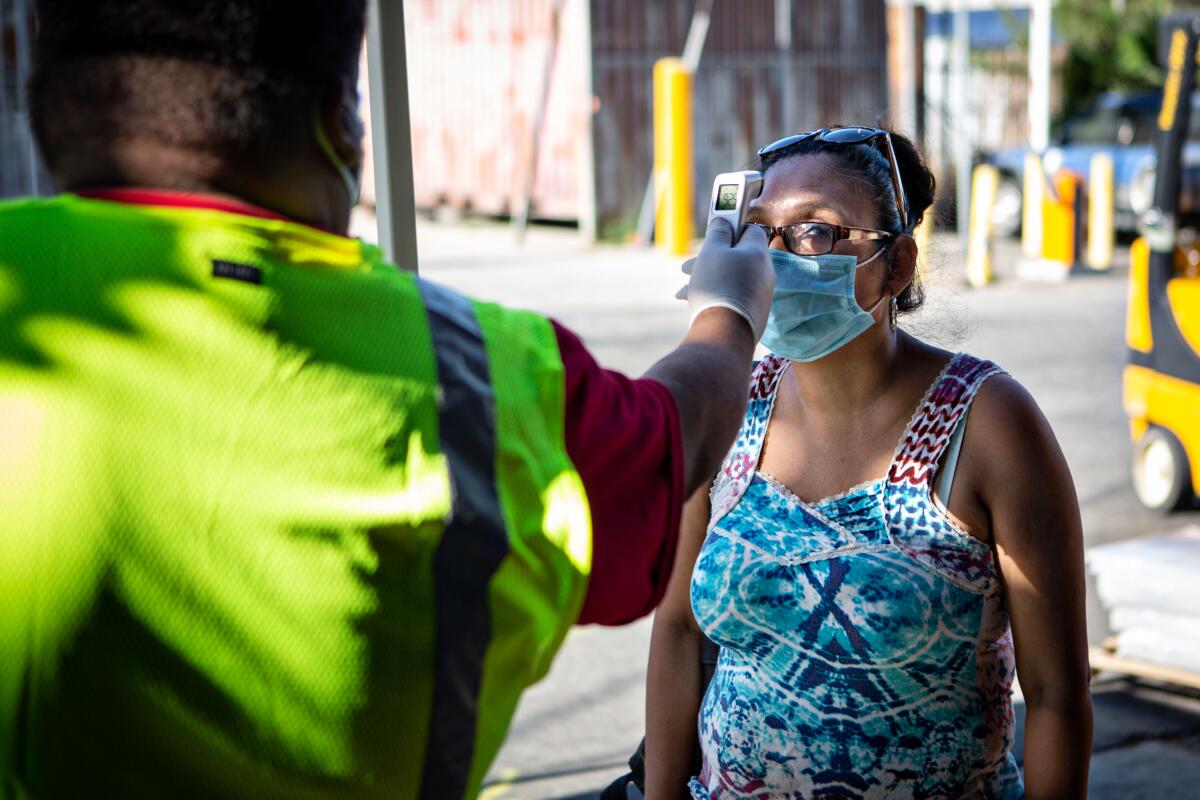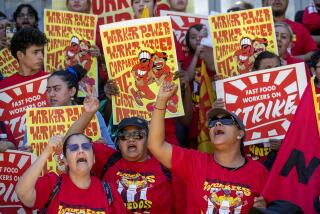L.A. County approves program for workers to form public health councils to curb coronavirus spread

Los Angeles County supervisors have unanimously approved a program in which workers from certain sectors will form public health councils to help ensure that employers follow coronavirus safety guidelines — an effort to expand the county’s enforcement of health orders and address the pandemic’s toll on essential workers.
The motion, which passed Tuesday morning, will pair councils in the food and apparel manufacturing, warehousing and storage, and restaurant sectors with third-party organizations that will educate workers on health orders and help them report violations.
The board also directed the county to prepare an ordinance to protect workers from retaliation, responding to concerns that low-wage workers are often reluctant to express safety issues because they fear being fired.
“Every worker has the right to feel safe in their workplace and to voice concerns without fear of losing their job,” Supervisor Mark Ridley-Thomas, who authored the motion with Supervisor Sheila Kuehl, said in a statement. “The Public Health Councils and proposed anti-retaliation ordinance will protect thousands of workers and provide the tools desperately needed to curb workplace infections during the pandemic.”
The effort comes as the county experiences a new surge of infections at levels seen during the summer, with social gatherings a particular area of concern. Health officials announced at least 2,000 new infections every day from last Thursday through Sunday. Before the uptick, the last time the county had surpassed 2,000 daily cases without the data being inflated by a backlog was Aug. 15, according to The Times’ tracker.
The plan to implement the public health councils, outlined in a Nov. 5 report to supervisors from Department of Public Health director Barbara Ferrer, takes into account concern expressed by business leaders by narrowing its initial focus to certain industry sectors. Within these areas, chosen largely based on workplace outbreak data, the county may prioritize outreach to businesses in geographic regions with high case counts, as well as to those with histories of violations.
Third-party organizations, such as nonprofits and unions, will be certified by the county to train councils on coronavirus health protocols. Employers are encouraged but not required to pay workers for their time participating on the councils, to allow councils to meet on-site and to help third party organizations reach out to interested workers, according to the motion.
The program will have a year-long budget projected at about $5 million.
Labor groups applauded the idea but said it should be applied more broadly across industries. The motion faced sharp opposition from business leaders, who said it would unnecessarily burden employers already struggling to overcome the pandemic.
Rob Nothoff, policy director for the L.A. County Federation of Labor, called the public health councils “a great step forward” that he wants to see applied in the grocery store sector as well.
“When workers are engaged, the public is safer,” he said. “Workers are at the front line to understand and to see what’s being followed and solutions to better address it. When they have a hand in shaping that process and participating in that process, we’re all better off.”
He expressed concern that workers may be reluctant to participate if they have to do so on their own time.
“Our take is, you can pay a little now and a lot later,” he said. “We have seen immense economic pain because we are not able to move forward because our cases continue to go up.”
Marissa Nuncio, director of the Garment Worker Center, said the public health councils are critical for the garment industry, which has seen one of the worst outbreaks among businesses in the county, and that the pandemic has exacerbated long-standing poor working conditions including cramped facilities and inadequate ventilation.
“We need to see workers really engaged in what their rights are, because this is literally life and death,” she said.
Some advocates have pointed to Overhill Farms, a frozen-foods processor in Vernon, as a model for how workers and employers can address safety issues together. The company, which was fined by the state for coronavirus health violations, formed a safety committee in which workers and company representatives have met weekly. Some of these workers have said they’ve seen progress in enforcement of social distancing and that they feel safer.
“When workers are empowered, they can actually enforce the county health order,” said Rachel Torres, deputy political and civil rights director at United Food and Commercial Workers Local 770, which represents several hundred Overhill employees. “Now that they have this regular interaction with their employer, they can talk things through and make sure it’s working.”
The motion has been opposed by the Los Angeles Area Chamber of Commerce, which has said it should not be broadly applied to industry sectors.
In a Nov. 9 letter to Supervisor Kathryn Barger, the Los Angeles County Business Federation, known as BizFed, encouraged the county to defer the establishment of public health councils, stating that it has “chosen to apply a fundamentally flawed process to target business owners with increased County scrutiny and frequently changing regulations at the most challenging time.”
It expressed concern about the proposed anti-retaliation ordinance, saying that efforts to pass another worker protection law are unnecessary, and requested that the county impose penalties for false claims of violations.
Sarah Wiltfong, BizFed’s policy manager, said the public health councils should only be used as a remedial action.
“We don’t know if they are necessary across the board, especially if the business is in compliance,” she said. “It seems to add several different layers to trying to get businesses in compliance as opposed to working with the Department of Public Health directly.”
The Board of Supervisors directed the Department of Public Health to report back in six months on the initiative’s progress.
More to Read
Sign up for Essential California
The most important California stories and recommendations in your inbox every morning.
You may occasionally receive promotional content from the Los Angeles Times.











